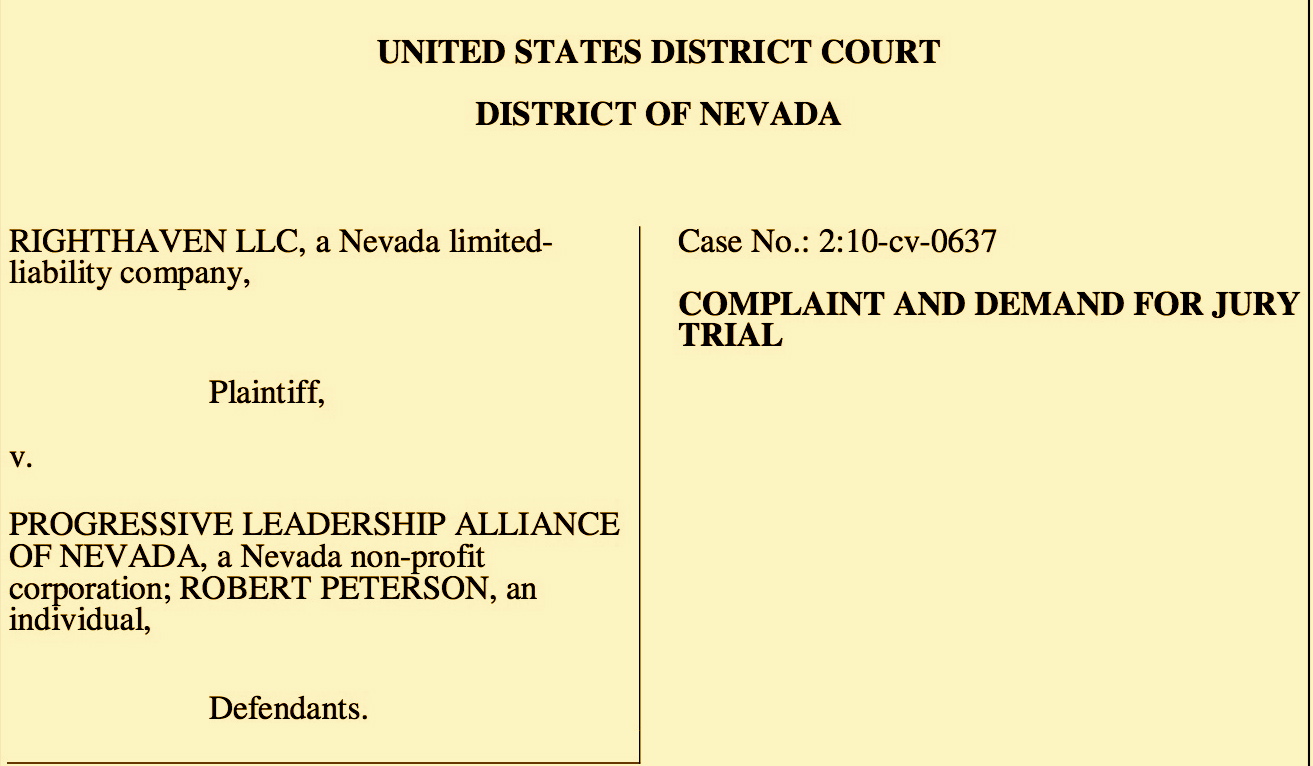Review-Journal sues its own source
Posted on | May 5, 2010 | 2 Comments
 Anyone who doubts that enforcement of copyright law is out of step with fair play and how journalism is gathered should consider that yesterday representatives for the Las Vegas Review-Journal filed suit against the Progressive Leadership Alliance of Nevada.
Anyone who doubts that enforcement of copyright law is out of step with fair play and how journalism is gathered should consider that yesterday representatives for the Las Vegas Review-Journal filed suit against the Progressive Leadership Alliance of Nevada.
The case against the liberal advocacy group joins a growing list of complaints by the R-J’s parent company, Stephens Media, and its legal affiliate, Righthaven LLC, which in recent months have filed suit against a number of organizations as disparate as a Killerfrogs.com, a sports booster website of Texas Christian University, the National Organization for the Reform of Marijuana Laws and a realty office based in Henderson, Nevada.
Each suit claims copyright infringement on the grounds that the organizations posted articles by Stephens Media outlets on their websites.
Leaving aside the Killer Frogs, marijuana advocates and the realtor, what makes yesterday’s lawsuit against the Progressive Leadership Alliance of Nevada remarkable is that among the exhibits in the complaint is one for posting a story on its website in which PLAN itself was a subject of the article.
The August 9, 2009 story “Pipeline receives go-ahead” quotes PLAN executive director Bob Fulkerson on a controversial Southern Nevadan water project that aims to tap the groundwater of rural Nevadans to serve Las Vegas. Most of the other subjects quoted were members of PLAN and its affiliate, the Great Basin Water Network.
While it is clear that the dark art of Internet “aggregation” has websites routinely stretching copyright laws, and while it is also clear that, strictly interpreted, it is illegal for a group to post copyrighted materials without permission, it the height of stupidity for a news organization to sue its own source over display of an article in which the defendant figures prominently.
Fulkerson was quoted today in the Las Vegas Sun as saying, “It appears they’re suing groups that don’t agree with their political agenda.”
That may be true, but that also may just be gravy. To judge by an earlier Sun story, the R-J’s proprietor is suing anyone who might think that what they publish is worthy of display.
UPDATE, 9.21pm: Shortly after posting, a fellow reporter wrote, “I think the political part of this (“suing groups that don’t agree with their agenda”) is unlikely. Righthaven is pretty notorious right now because of this latest round of suits.” He then linked to a Mediapost.com report quoting Sam Bayard, assistant director of the Citizen Media Law Project. “It’s unlikely that there’s any kind of fair use defense for simply posting an entire article, regardless of the motivation or beliefs about the law,” said Bayard.
I’m sure my reporter friend and Bayard are right, but that’s not my point. By all means the R-J and other Stephens Media outlets should call out unpermitted use of their articles. Many cans of Red Bull to the poor sod assigned the task. But to go beyond a civil request to simply remove unapproved reproductions, or submission of an invoice for standard serialization rates proportionate to readership, is to undermine the news-gathering capability of their own reporters.
The PLAN suit offers a perfect example. The R-J’s Henry Brean, author of one of the contested articles, is hands-down the best reporter on the day to day evolution of the Las Vegas pipeline project. For all intents and purposes, he is the project’s chronicler. It also happens that PLAN is the leading advocacy group opposing the pipe. When Brean’s employers act in a way that could arguably bankrupt PLAN, and in a way out of all proportion to a small copyright infraction, they leave Brean to seek comment from a source under siege by his own employer.
That is an impossible position for a reporter. The same applies to marijuana policy. How can a Stephens Media reporter be expected to do his job when his employers are in take-down mode with NORML? Stephens Media and Righthaven might be right on the letter of copyright law, of the ownership of news, but they have proved themselves magnificently clueless about what’s involved in gathering it. By thus hampering their reporters, they don’t devalue what they publish, but render it worthless — all in the name of punishing the likes of non-profits, college football fans and small businesses for the quaint, even admiring crime of posting one or more of their articles on an Internet bulletin board.
Tags: chance of rain > Las Vegas Review-Journal > Progressive Leadership Alliance of Nevada > Righthaven llc
Comments
2 Responses to “Review-Journal sues its own source”
Leave a Reply



May 6th, 2010 @ 10:15 am
I agree with this, to a point. R-J should allow outsiders to link to the first few sentences. If they take down or firewall articles, then they are outa line.
Oh, and I totally agree that people use lawsuits to gag others they dislike 🙂
May 6th, 2010 @ 11:10 am
Thanks David. Good points, but not mine. This may not be the venue to discuss what is in every way an inside-journalism issue that even my reporter friend initially missed. Journalism is a craft like no other, with rules like no other. The ability to navigate through conflict to provide accurate snapshots and maintaining access with parties on all sides of issues is critical. If a newspaper proprietor follows a policy that affects the news-gathering capability of his reporters, then he is corrupting his own product. Henry Brean is a good reporter but until the R-J comes to its senses about how it is going to respond to a tiny infraction by PLAN, then his work on the pipeline project is compromised. Soon it may be worthless, through no fault of Brean’s. The same problem will occur for every Stephens reporter covering stories in which Righthaven defendants are involved. Their work is discredited even if Stephens didn’t intend to use copyright law as a gag, which I don’t think is the case here. I think Righthaven would sue the Boy Scouts of America, a local garden club, a convent. Let them off, hang them high… that’s now up to the courts. What astonishes me is Stephens Media’s willingness to protect its product while ruining its brand.